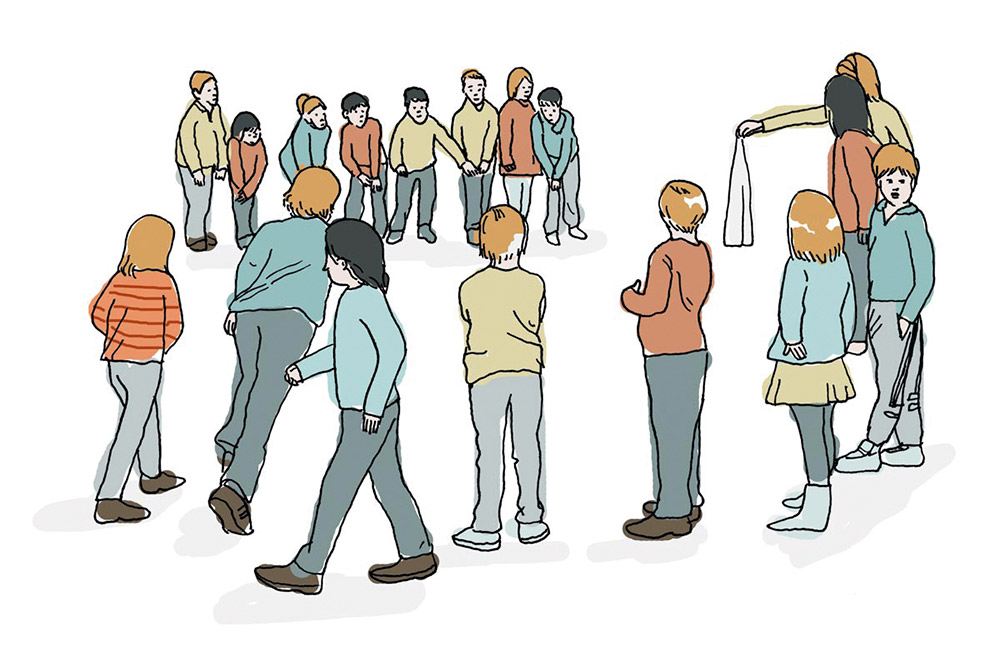
- The 'Parkea euskaraz' project is underway in the Region of Pamplona. The adults and children of Euskaldunes meet weekly to speak in Basque in the neighborhood or town. The objective is that boys and girls become Basque among them, and for this purpose the basis is that parents, family members or adult friends be an example.

Other projects are more numerous, i.e. children meet in leisure time and take initiatives to promote their use through organized programmes. What they have started in the Region of Pamplona is otherwise, they have focused on the Parquetarrak project of Donostia and a similar program of Lasarte-Oria. Children don't walk on their own, they're as important as they are. Adults are necessarily Euskaldunes or Quasi-Euskaldunes, either parents, family members or trusted friends, and among them there is talk in Euskera, trying to set an example to children. This is the hallmark of the Basque Parke initiative, in which adults not only speak Basque to children, but children listen to adults in Basque.
Other objectives are the drivers of the initiative. They want children to relate Euskera to spaces outside regulated education, to leisure, to enjoyment. Another objective is to create groups among Euskaldunes residents in the neighborhood or in the village. And they have a final end: empowering parents. Iñigo Otxoa is a member of the initiative and we have asked him what empowerment means: "We believe it is an initiative for living in Euskera. We would like to see as the group is created, as trust is gained, other issues, which is commerce, which is the cultural agenda of the neighborhood, which comes Korrika...".
Adults must be Euskaldunes. More than one who has no capacity to speak in Basque asks if it is a project for them: "It requires a minimum of knowledge of the Basque Country. We ask them if they have around them an Euskaldun adult to go with the child, and if they do not, and they continue to express their desire to participate, we have put on the table a kind of 'start in Euskera in the park' so that the Castilian speaking families empathize and begin to learn Euskera the first words". For the time being, Erdaldunes parents have not launched such initiatives.
From the banner to the park
The initiative is part of the group of Fathers and Mothers of Children's Schools. In its history, the main demand has been to increase the supply of public children's schools in Euskera in the Region of Pamplona. Otxoa looked at his activity and reflected: "We say that the last two years have been quite pankers, we have held political meetings, mobilizations, we have asked for children's schools to be in Basque... We have reflected on whether everything has to be pan-gender or something that we could generate a builder." They also decided to give importance to the after-school dimension, convinced that, in addition to regulated education, leisure and the domestic environment are also important in the transmission of language. It was decided to break the new roads and a pilot test was carried out in May-June. Encouraged by the results, they designed a plan for the entire course.
Ten sessions until February
A plan has been drawn up for the time being until February. Children aged 2-3 years and 4 to 6 years will meet. They will meet once a week. The groups have been formed in the locality of Ansoáin and in the neighborhoods of Chantrea, Rochapea and Casco Viejo de Pamplona. The Sortzen Association collaborates with the project and the management will be carried out by the Dindaia Foundation, such as inscriptions, quota collection, provision of dynamizers and material. Ten sessions will be held, organized by five parents and five others directed by dynamizers through the Dindaia Foundation. In the pilot test carried out in the spring they realized, in the end, that the people who sign up for the initiative are fathers and mothers who also participate in it, so you have to put some sort of hook in the actions. Therefore, the February sessions will place particular emphasis on the design of activities that are also liked by fathers and mothers. Tours, workshops or crafts are successful. From February to the end of the year, they will conduct a new campaign in which this perspective will be addressed, that is, they will try to strengthen the activities organized by parents.